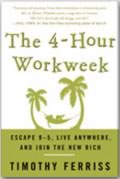Who Earns Minimum Wage? A Statistical Profile
There's been some discussion recently among moneybloggers about writing more for those who earn the minimum wage, and for those who face other financial difficulties. This is a good thing. But all this talk made me wonder: How prevalent is the minimum wage? Who works minimum wage jobs? I decided to do some research.
According to the U.S. Department of Labor, the median annual income of a U.S. worker is $32,140. Federal minimum wage is currently $5.85 an hour, or about $11,500 per year — just above the poverty line. Of the 76.5 million people paid by the hour in the United States in 2006, 2.2% make minimum wage or less. Here are some generalizations we can make about minimum wage workers:
- Most minimum wage earners are young. While 2.2% of all hourly workers earn minimum wage or less, just 1.4% of workers over the age of 25 are paid at or below the Federal minimum wage. More than half (51.2%) of minimum wage workers are between 16 and 24 years old. Another 21.2% are between 25 and 34.
- Most minimum wage earners work in food service. Nearly two-thirds of those paid minimum wage (or less) are food service workers. Many of these people receive supplemental income in the form of tips, which the government does not track.
- Most minimum wage earners never attended college. Just 1.2% of college graduates are paid the minimum wage. If you only have a high school degree, you're more likely (1.9%) to be paid minimum wage. Those without a high school degree are nearly three times as likely (3.7%) to earn minimum wage. 59.8% of all minimum wage workers have no advanced education.
- Finally, as you might expect, part-time workers are five times more likely to be paid the minimum wage than full-time workers.
You can find more information at the official characteristics of minimum wage workers page, and in the page of data tables. Also, the Department of Labor has a map that shows how state minimum wage rates compare to Federal minimum wage rates:
Requesting (and Receiving) the Raise You Deserve
 First things first — when is a good time to ask for a raise? Coming off a strong performance review in which your boss acknowledged your accomplishments is a good bet, because he will probably be expecting you to broach the subject of money. If you've just taken on a new role, or your management has raised the bar for your performance, it is perfectly legitimate to ask for an appointment to discuss "compensation commensurate with new responsibilities".
First things first — when is a good time to ask for a raise? Coming off a strong performance review in which your boss acknowledged your accomplishments is a good bet, because he will probably be expecting you to broach the subject of money. If you've just taken on a new role, or your management has raised the bar for your performance, it is perfectly legitimate to ask for an appointment to discuss "compensation commensurate with new responsibilities".
Before you sit down with your manager, you'll want to be prepared with a list of contributions that have enhanced the bottom line. As you're putting together your case, be hard on yourself. Look at the situation from your company's point of view. Have you honestly acquired such valuable skills, performed at such a high level, and exceeded expectations to such a degree that your company should shell out more money to keep you?
When scheduling the meeting, pick a time when your boss's stress level and workload are as manageable as possible and tell her what you want to talk about so she's prepared. An informal setting like lunch often works best because it allows you to relate to your manager on a personal level. Before you meet face-to-face, decide on a number that you'd be satisfied with, and think about how you'll respond if you don't get it.
H
The 4-Hour Workweek review and summary
When I picked up The 4-Hour Workweek, I was worried it was some sort of "get rich quick" book. The first few pages didn't do much to change my mind.  The author, Timothy Ferriss, makes a lot of bold claims, such as: "How do you create a hands-off business that generates $80,000 per month with no management? It's all here."
The author, Timothy Ferriss, makes a lot of bold claims, such as: "How do you create a hands-off business that generates $80,000 per month with no management? It's all here."
But something happened during the first few chapters. When I read a book, I use small sticky notes to mark interesting passages. After the first 100 pages of The 4-Hour Workweek, the book was thick with stickies. By the time I was finished, I had used an entire pad!
Ferriss does make a lot of bold promises, and some of the details along the way do read like the confessions of a get-rich-quick scammer. But I believe that an intelligent reader can easily extract a wealth of useful ideas from the book. For me, it's a keeper. I've read it three times already, and will probably read it again before the end of the year.
Career advice for the college graduate
This article was written by Lisa Lessley Briscoe.
My friend (and fellow Bearcat) Lisa writes: "I was just poking around on GRS (I don't usually read) and noticed that you'd posted an entry for college graduates recently. Funny how summer rolls around and you start thinking about stuff." She's passed along some additional advice for those just entering the workplace.

Congratulations, you just graduated from an excellent liberal arts college!
More money: 5 ways to earn extra cash in your spare time
The discussion yesterday about how to earn money when you've lost your job got me thinking about ways to earn extra income outside regular employment. None of these are quick fixes, but they're ways to generate cash in your spare time.
Get a Second Job
A second job can be an excellent way to earn extra money if you have the time and energy. Why have a second job?
What Do You Want to Be When You Grow Up?
How can you know what you want
Till you get what you want
And you see if you like it?
— Steven Sondheim, Into the Woods
We had some good friends over for dinner the other night. While we waited for the roast to finish, Wayne and I took the air on the back porch. We talked about work. I told him that this is a slow time of year at the box factory.
"Yeah," he said. "It's slow for us at the dealership, too. The last three weeks have been awful." Wayne works for a local car dealership. He recently moved from sales to finance. He's the hardest worker I know, often putting in six ten-hour (or twelve-hour!) days in a single week. Continue reading...
How to Get the Most Out of a College Job
A college job can be a chore. Or it can be the doorway to future success. The choice is yours.
I asked Michael Hampton, director of career development for Western Oregon University, for advice on how college students should approach work. What should they look for in a job? What should they try to get out of it? Are college jobs really that important? We drafted the following seven tips, which we believe can help you to get the most out of your college work experience.
Connect Jobs With the Future
Try to connect your jobs — even part-time jobs — with something you enjoy doing. Ideally each job would relate to something you think you might want to do later in life. (This isn't always possible — it's an ideal.) This can help you determine if the job is actually a good fit. Test-drive jobs like you would test-drive cars. Students often think they want the prestige and feel of the glamorous BMW/Lexus job, but after a while they realize they're better suited for a Honda/Nissan job. The opposite happens, too.
On the road to nowhere: The true story of the worst job I ever had
Your job is one of your most important assets. It gives you earning power. It can bring you personal fulfillment. But what happens when you're stuck in a job you hate? Here's the true story of the worst job I ever had.
Unlimited Income Potential
I made some poor choices at the end of my college career; as a result, I graduated without a prospect for work. No matter -- I lived off my credit cards for a few months, basking in the glow of adulthood. Eventually I realized that I needed to find a job.
My father, a life-long salesman, and always a sucker for other salesmen, set me up to meet with an insurance guy who had tried to sell him a policy. We met in a Denny's on the far side of Portland early on a Saturday morning. The guy gave me long, slick pitch, touting the job's "unlimited income potential". He needn't have bothered. I needed work and was dumb enough to think that this was a perfect. I signed up.